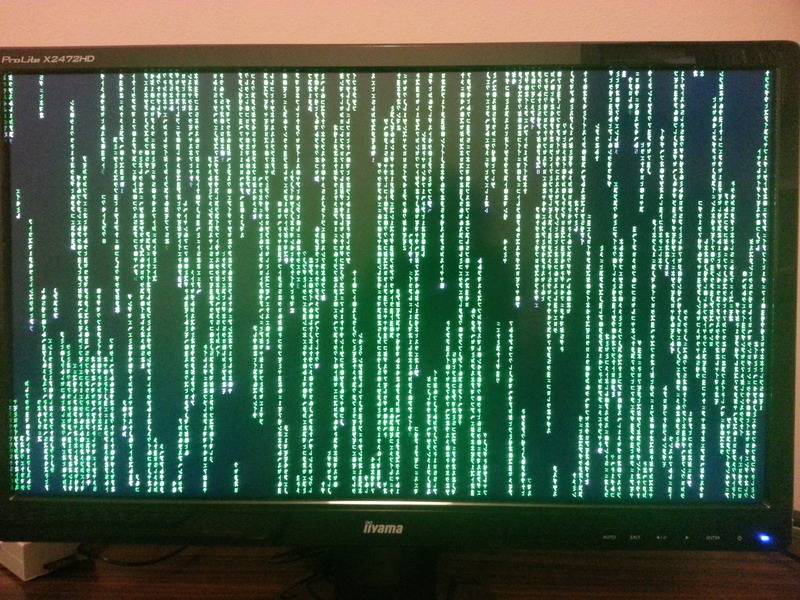Difference between revisions of "Hardware: Raspberry Pi - Matrix Pi"
Lukas Dzunko (talk | contribs) (→How to install.) |
Lukas Dzunko (talk | contribs) |
||
| (10 intermediate revisions by the same user not shown) | |||
| Line 3: | Line 3: | ||
[[File:Matrix_ip.jpg]] | [[File:Matrix_ip.jpg]] | ||
| − | The intent is not to provide lightweight Matrix like display but to configure my development environment. My UI is not ready yet but I want to test video output and stability under CPU load. Cmatrix is providing both, nice looking output and is using lot of CPU. In future I'll replace it | + | The intent is not to provide lightweight Matrix like display but to configure my development environment. My UI is not ready yet but I want to test video output and stability under CPU load. Cmatrix is providing both, nice looking output and is using lot of CPU. In future I'll replace it with my UI ... |
=== How to install === | === How to install === | ||
| − | I am using [https://github.com/debian-pi/raspbian-ua-netinst/releases#raspbian-ua-netinst/raspbian-ua-netinst-latest.zip raspbian-ua-netinst] as it don't require interaction during install. Good thing is that <code>installer-config.txt</code> and <code>post-install.txt</code> are retained during re-install. I put my configuration script inside <code>post-install.txt</code> in way that installer is ignoring it but I can invoke it after system | + | I am using [https://github.com/debian-pi/raspbian-ua-netinst/releases#raspbian-ua-netinst/raspbian-ua-netinst-latest.zip raspbian-ua-netinst] as it don't require interaction during install. Good thing is that <code>installer-config.txt</code> and <code>post-install.txt</code> are retained during re-install. I put my configuration script inside <code>post-install.txt</code> in way that installer is ignoring it but I can invoke it later after system is installed. |
| + | |||
| + | ==== Step 1 ==== | ||
| + | Download installer and unpack it on SD card (for details check [https://github.com/debian-pi/raspbian-ua-netinst/releases#raspbian-ua-netinst/raspbian-ua-netinst-latest.zip raspbian-ua-netinst]). | ||
| + | |||
| + | ==== Step 2 ==== | ||
| + | Unpack [[Media:Matrix-pi.zip|Matrix-pi.zip]] to SD card. | ||
| + | |||
| + | ''Note 1:'' <code>installer-config.txt</code> is only template. | ||
| + | |||
| + | ==== Step 3 ==== | ||
| + | wait for installer to do it's job | ||
| + | |||
| + | ==== Step 4 ==== | ||
| + | log to newly installed raspbian system and execute: | ||
| + | <pre> | ||
| + | bash -x /boot/post-install.txt install | ||
| + | </pre> | ||
| + | |||
| + | ==== Step 5 ==== | ||
| + | Enjoy matrix display on your monitor :o) | ||
Latest revision as of 22:47, 13 February 2016
This is quick and dirty way how to get my "Matrix Pi" operating.
The intent is not to provide lightweight Matrix like display but to configure my development environment. My UI is not ready yet but I want to test video output and stability under CPU load. Cmatrix is providing both, nice looking output and is using lot of CPU. In future I'll replace it with my UI ...
How to install
I am using raspbian-ua-netinst as it don't require interaction during install. Good thing is that installer-config.txt and post-install.txt are retained during re-install. I put my configuration script inside post-install.txt in way that installer is ignoring it but I can invoke it later after system is installed.
Step 1
Download installer and unpack it on SD card (for details check raspbian-ua-netinst).
Step 2
Unpack Matrix-pi.zip to SD card.
Note 1: installer-config.txt is only template.
Step 3
wait for installer to do it's job
Step 4
log to newly installed raspbian system and execute:
bash -x /boot/post-install.txt install
Step 5
Enjoy matrix display on your monitor :o)
